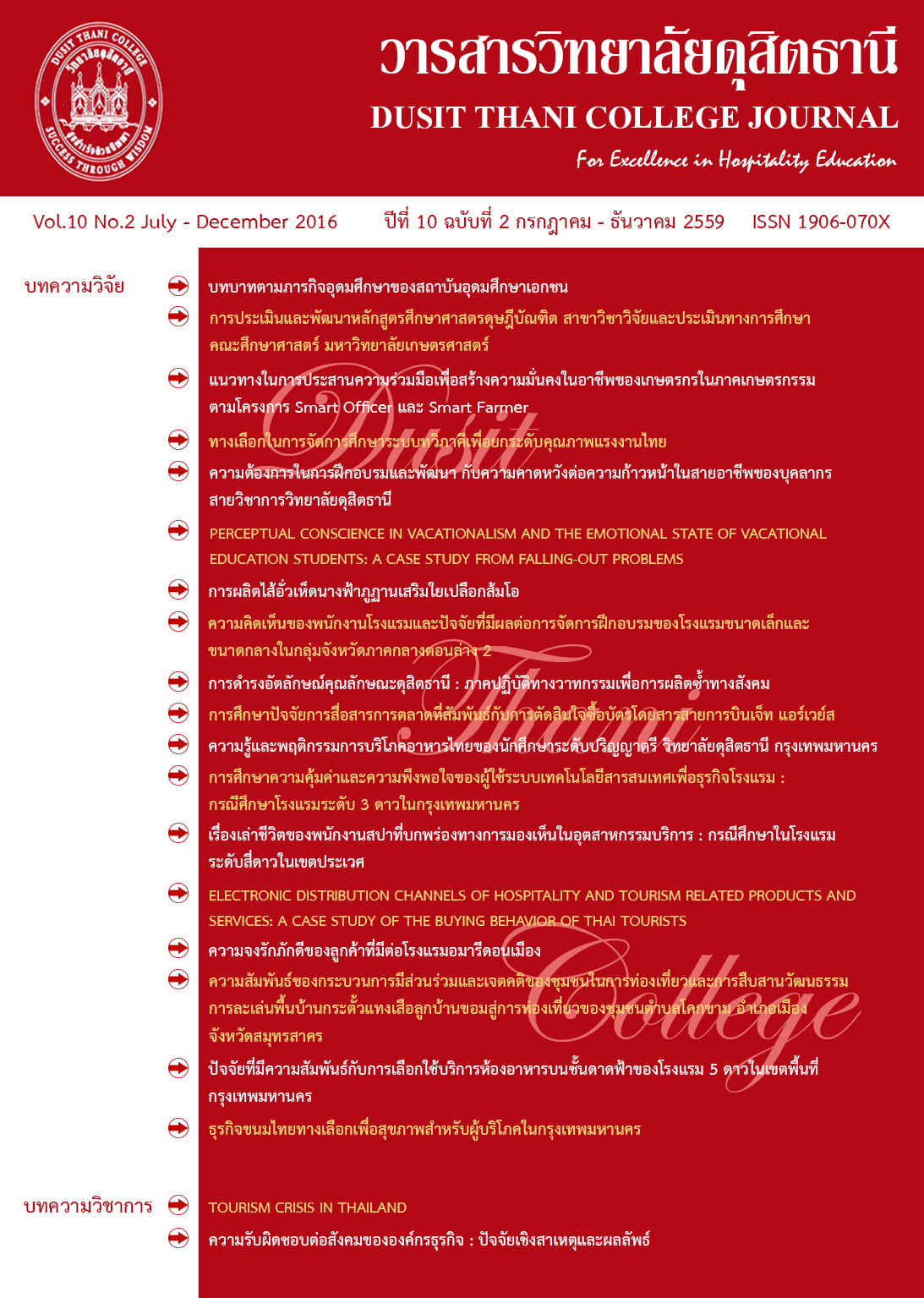ELECTRONIC DISTRIBUTION CHANNELS OF HOSPITALITY AND TOURISM RELATED PRODUCTS AND SERVICES: A CASE STUDY OF THE BUYING BEHAVIOR OF THAI TOURISTS
Main Article Content
Abstract
The objectives of this study were 1) to study the consumer demographic segmentation of tourists who book or purchase hospitality and tourism related products and services booking systems 2) to examine the environmental influences of tourists who book or purchase hospitality and tourism related products and services booking systems and 3) to evaluate the perception of tourists, booking or purchasing hospitality and tourism related products and services booking systems.
The sample consisted of 400 Thai internet users who have used online purchasing and booking on hospitality and tourism related products and services. This research used the descriptive and inferential statistics and using a designed questionnaire survey to collect data from the respondents. The data was analyzed by using percentage, frequency, mean and standard deviation. The hypotheses were tested by independent sample T-test, One-way Anova, and Pearson product-moment correlation statistics. The item-objective congruency (IOC) index is used Content validity for and used a pilot test for assessing the reliability of questionnaire
Research findings were as follows: 1) Mostly, young generation tourists were the biggest group using online transportation and accommodation purchase; 2) The buying behavior of Thai tourists’ has a positive relationship on the perception 3) The tourists received the impact mainly from internal factors, while external factors can play an important role for searching, and finding the details in the website and other sources.
Article Details
Article Screening Policy
- All research and academic articles to be published must be considered and screened by three peer reviews in the relevant field / article.
- All articles, texts, illustrations and tables published in the journal are the personal opinions of the authors. Editors don't always have to agree. And no responsibility whatsoever is the sole responsibility of the author.
- The articles to be published must never be published. Where did you first publish? And not in the consideration of other journals If the audit found that there has been a duplicate publication It is the sole responsibility of the author.
- Any article that the reader sees as being plagiarized or impersonated without reference. Or mislead the work of the author Please let the journal editor know it will be your greatest blessing.
References
Bertram, D. (2007). Likert Scales. Retrieved from https://poincare.matf.bg.ac.rs/~kristina/topic-dane-likert.pdf
Borah, R. (2013). Independent of study, Factor influencing purchasing decisions toward Toyato cars in Bangkapi district.
Calitz, M. (2009). Retrieved from PILOT STUDY: https://uir.unisa.ac.za/bitstream/handle/10500/1648/06chapter5.pdf
Crnojevac, I. H., Gugić, J., & Karlovčan, S. (2010). eTourism:. A comparison of Online and Offline Bookings and the Importance of Hotel Attributes, 34.
Grewal, D., & Levy, M. (2010). Marketing (2nded.). McGraw-Hill.
Kotler, P., Bowen, J. T., & Makens, J. C. (2009). Marketing for hospitality and tourism industry (5thed.). Pearson education.
Kunlong, A. P. (2012, October 24). Retrieved from https://www.ipernity.com/blog/248956/424224
Nuntasen, S. (n.d.). Index of consistency: IOC. Retrieved from https://www.gotoknow.org/posts/370878
Peng, H., Xu, X., & Chen, C. (2013, June). Tourist Behaviors in Online Booking. Communications in Information Science and Management Engineering, 3(6), 280-285.
The 2013 Information and Communication Technology Survey in Household, National Statistical Office, Ministry of Information and Communication Technology. (2013). Retrieved from Ministry of information and communication technology: https://www.nso.go.th/
Williams, A. (2002). Understanding the hospitality consumer. Burlington, MA, USA: Elsevier Butterworth-Heinemann.
Yoopetch, C. (2013, November). THM TOURISM AND HOSPITALITY MANAGEMENT Quarterly review. Tourism and Hospitality Trends, 9.


